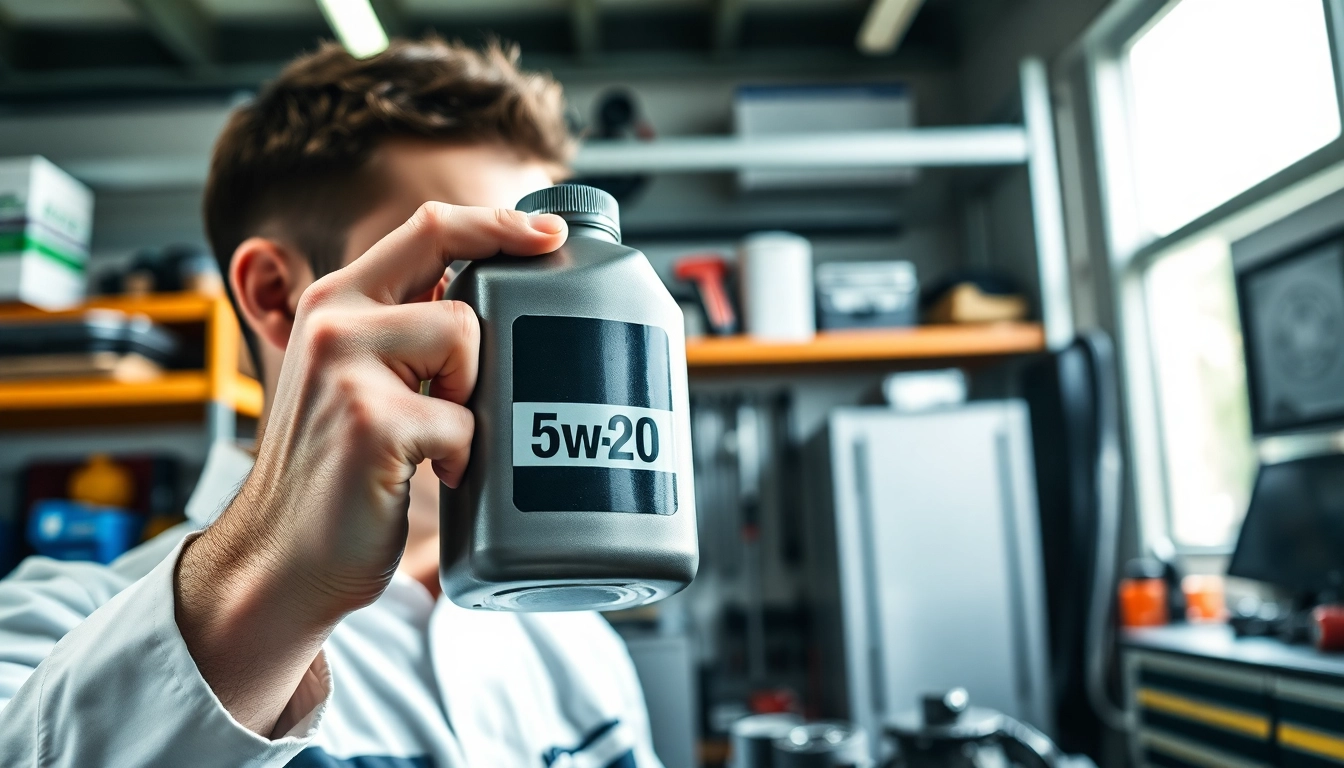
Understanding Motor Oils: The Role of Oil 5w-20
Motor oil is vital for ensuring an engine runs smoothly and efficiently, reducing wear and tear over time. Among the various types of motor oils available, oil 5w-20 stands out due to its unique viscosity characteristics. Viscosity refers to the thickness of the oil and its ability to flow at different temperatures, which is crucial in maintaining optimal engine performance. This article delves into the specifics of oil 5w-20, exploring its benefits, comparative analysis with other oils, application tips, misconceptions, and performance metrics.
What is Oil 5w-20?
Oil 5w-20 is a multi-viscosity motor oil that offers a blend of fluidity and viscosity, particularly suited for light-duty vehicles. The “5” denotes its low-temperature viscosity rating, allowing the oil to flow easily when starting the engine in cold conditions, while the “20” indicates the higher viscosity at standard operating temperatures. This balanced formula helps reduce engine friction and improve fuel efficiency, making it a popular choice among automakers and consumers alike.
Typically, oil 5w-20 is synthetic or semi-synthetic, providing superior performance compared to conventional oils. Synthetic oils are designed to provide enhanced protection and longer service intervals, addressing the demands of modern engines that operate under more stringent conditions.
Benefits of Using Oil 5w-20
The decision to use oil 5w-20 over other grades can be attributed to several benefits it offers:
- Improved Fuel Economy: Oil 5w-20 reduces engine drag, contributing to better fuel efficiency. This is particularly beneficial for drivers looking to enhance their vehicle’s mileage.
- Optimal Protection: Formulated to protect engines under a wide range of temperatures, oil 5w-20 ensures that critical engine components are shielded from wear and tear over time.
- Versatility: It meets the requirements of various vehicles, particularly those designed for modern driving conditions that often involve stop-and-go traffic.
- Extended Oil Change Intervals: Many synthetic oils can last longer than conventional oils, which saves money in the long run due to fewer oil changes.
How Oil 5w-20 Improves Engine Longevity
The longevity of an engine is significantly impacted by the choice of oil used. Oil 5w-20 contributes to engine longevity in several key ways:
- Reduced Friction: By ensuring a consistent flow of oil to moving parts, oil 5w-20 minimizes the friction generated during engine operation. This leads to a colder engine running temperature and less wear on components.
- Enhanced Thermal Stability: Oil 5w-20 maintains its viscosity better than other oil grades when exposed to high temperatures. This thermal stability protects the engine from overheating and breakdown.
- Effective Contaminant Removal: The formulation of oil 5w-20 facilitates the suspension and removal of harmful contaminants, preventing sludge buildup that can obstruct engine components and performance.
Choosing the Right Oil: Oil 5w-20 vs. Other Options
Selecting the correct motor oil for your vehicle can dramatically affect both performance and longevity. Understanding how oil 5w-20 compares with other options, such as 5w-30, 10w-30, and others, can help make an informed decision.
Comparative Overview of Common Motor Oils
Motor oils come in various grades, each suited to different driving conditions and engine specifications. Here’s a brief comparison:
- 5w-30: Provides similar cold start capabilities but is slightly thicker at operating temperatures than oil 5w-20. This can offer extra protection for high-performance or older engines that prefer thicker oil.
- 10w-30: Thicker at both low and high temperatures compared to 5w-20, making it suitable for warm climates or older engines but may reduce efficiency in colder conditions.
- 0w-20: Even lower viscosity than 5w-20 at cold temperatures but offers reduced performance at high temperatures for certain engines. Better for colder climates where rapid cold starts are required.
Performance Under Different Conditions
Environmental conditions play a significant role in the performance of motor oils. Oil 5w-20 excels in both warm and moderate climates, providing optimum flow and protecting engine components from wear. However, in extremely hot environments, a thicker oil might be more suitable, while colder climates will benefit from lower viscosity oils. Matching the oil viscosity to the ambient temperature can maintain efficient engine performance and longevity.
How to Select the Best Oil for Your Vehicle
When selecting oil for your vehicle, consider the following steps:
- Consult Your Owner’s Manual: Always refer to your vehicle’s manufacturer recommendations regarding oil grades.
- Evaluate Your Driving Conditions: Analyze your typical driving habits (long commutes, short trips, extreme weather) to determine which oil will offer the best protection.
- Consider Oil Type: Decide between conventional, synthetic, or semi-synthetic oils based on your engine’s age and requirements.
- Check for Certifications: Ensure the oil meets industry standards, such as those set by the American Petroleum Institute (API).
Application Tips for Oil 5w-20
To maximize the benefits of oil 5w-20 in your vehicle, proper application is essential. Below are tips and procedures to ensure optimal engine performance.
When to Change Your Oil
Changing oil at regular intervals is crucial for maintaining engine health. Generally, it’s advised to change oil every 5,000 to 7,500 miles when using synthetic oil. However, this can vary based on driving conditions, use of the vehicle, and manufacturer recommendations. Monitoring oil levels and condition using the dipstick can help identify the need for a change sooner, especially if the oil appears gritty or dark.
Correct Oil Change Procedures
Follow these steps to perform an oil change safely and effectively:
- Gather Tools: Ensure you have the necessary tools, including an oil filter wrench, oil pan, funnel, and the correct type and amount of oil.
- Warm Up Your Engine: Running your engine for a few minutes warms the oil, allowing it to drain out more smoothly.
- Drain Old Oil: Use the oil pan to capture the draining oil and ensure the vehicle is elevated on a level surface.
- Replace Oil Filter: Remove the old oil filter and replace it with a new one to prevent any contaminants from entering the new oil.
- Add New Oil: Using a funnel, add the new oil slowly, checking the oil level with the dipstick periodically.
Using Oil Additives with Oil 5w-20
While oil 5w-20 provides adequate protection on its own, some drivers consider using additives. These can offer additional benefits such as improved wear protection, reduced friction, or enhanced cleaning properties. It’s vital to ensure that any additive used is compatible with synthetic oils and does not contain substances that may harm engine seals or components. Follow the manufacturer’s instructions and consider consulting a professional before application.
Common Misconceptions About Oil 5w-20
Several myths surround motor oil, particularly regarding oil 5w-20. Understanding these misconceptions can lead to better decisions regarding oil choice.
Debunking Myths Related to Oil Viscosity
One common misconception is that thicker oil always provides better protection. However, this is not universally true. Oils like 5w-20 are designed to offer adequate protection without being overly viscous, which can cause inefficiencies like poor fuel economy and sluggish performance during cold starts.
The Truth About Oil Additives
Another popular belief is that all oil additives are necessary. While certain additives can enhance performance, modern oils like 5w-20 already contain a well-balanced formulation of additives, including detergents and anti-wear agents. Additional additives can sometimes create imbalances, so it’s crucial to choose them wisely.
Long-Term Effects of Using Oil 5w-20
Some drivers fear that using a lower viscosity oil like 5w-20 might lead to increased engine wear. However, studies have shown that when used correctly and in the right applications, oil 5w-20 can protect modern engines effectively, especially those that are designed with tighter tolerances. Regular maintenance and timely oil changes counteract potential long-term issues.
Evaluating Performance Metrics with Oil 5w-20
Monitoring the performance of oil 5w-20 in your engine involves keeping track of several critical metrics. Understanding these metrics provides insight into the oil’s efficiency and the engine’s overall health.
What to Monitor for Optimal Use
Key performance indicators for assessing the effectiveness of oil 5w-20 include:
- Oil Pressure: Maintain proper oil pressure to ensure all engine components are adequately lubricated. Low oil pressure can indicate oil degradation or leaks.
- Engine Temperature: Regularly check the engine temperature gauge. High readings may indicate oil breakdown or insufficient lubrication.
- Oil Color and Texture: Assess the oil’s color and texture during oil checks. Healthy oil should be clear or amber, while dark, gritty oil necessitates a change.
Impact on Fuel Efficiency
Using oil 5w-20 can lead to improved fuel efficiency due to its lower viscosity and ability to minimize friction. Fuel efficiency can be monitored through regular tracking of mileage and fuel usage. Any significant changes in consumption can highlight the need for an oil change or indicate other underlying issues.
Understanding Engine Wear Measurements
Monitoring engine wear is crucial for understanding how well oil 5w-20 is performing. Metrics such as the condition of engine components, analysis of oil samples, and regular maintenance checks can provide indicators. Engine wear can often be tracked through oil analysis programs, which offer valuable insights into the condition of the engine and oil.
In conclusion, oil 5w-20 offers numerous benefits for modern engines, including improved fuel economy, better protection, and enhanced engine longevity. By understanding its properties, proper application, and dispelling common misconceptions, vehicle owners can make informed decisions to optimize engine performance and longevity. As vehicle technology advances, oil formulations like 5w-20 continue to play a pivotal role in ensuring vehicles run smoothly and efficiently.







